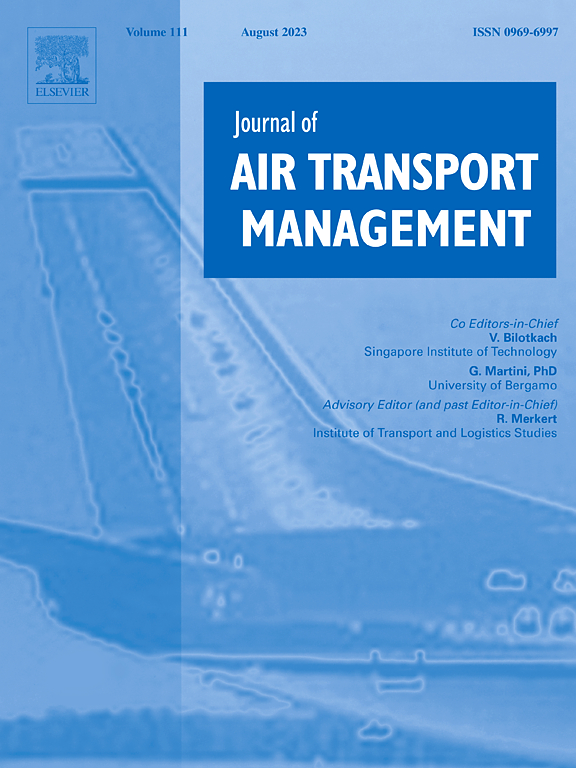新冠肺炎疫情对航空公司业绩和旅游需求的影响——来自西南地区准自然实验的证据
IF 3.6
2区 工程技术
Q2 TRANSPORTATION
引用次数: 0
摘要
考虑到 COVID-19 大流行的影响,本文对影响航空公司绩效的因素以及航空公司绩效对国内旅游需求的影响进行了实证研究。首先,采用 Tobit 模型研究影响航班取消率的重要因素和内在机制。其次,运用面板向量自回归模型(PVAR)定量衡量 COVID-19 对航班频率和乘客数量的影响程度和持续时间。最后,进一步讨论了 COVID-19 大流行期间航空公司表现(航班频率)对旅游需求可能产生的影响。结果表明,旅行禁令、目的地确诊病例数量、航线多样性和低成本航空公司的座位份额是航班取消率上升的主要原因,而高载客率则减少了航班取消。同时,在研究期间,COVID-19 新增病例对航班频率和旅游需求的负面影响逐渐减弱,趋于稳定,具有滞后效应。此外,随着疫情和旅游政策影响的逐渐减弱,航空运营的恢复速度和时间均早于旅游需求的恢复速度,这表明航空业可能在旅游业的复苏中扮演着关键角色。通过将重大突发事件作为准自然实验,研究结果有助于 "航空通达-旅游 "关系的相关讨论。本文章由计算机程序翻译,如有差异,请以英文原文为准。
Impacts of the COVID-19 pandemic on airline performance and tourism demand: Evidence from a quasi-natural experiment in Southwest China
This paper empirically investigates the factors that impact airline performance and the effects of airline performance on domestic tourism demand considering the impact of the COVID-19 pandemic. Firstly, the Tobit model is employed to study the significant factors and underlying mechanisms that affect flight cancellation rate. Secondly, the panel vector autoregressive model (PVAR) is applied to quantitatively measure the degree and duration of the impact of COVID-19 on flight frequency and passenger numbers. Finally, the possible impact of airline performance (flight frequency) on tourism demand during the COVID-19 pandemic is further discussed. The results suggest that travel bans, the number of confirmed cases in destination, route diversity, and share of low-cost carriers’ seats are the main reasons for the rise in flight cancellation rate, while high load factors reduce flight cancellations. Meanwhile, the negative impacts of new COVID-19 cases on both flight frequency and tourism demand gradually attenuated to stability over the study period with a lag effect. In addition, as the impact of the pandemic and travel policies gradually diminishes, airline operation recovers faster and earlier than tourism demand, indicating the airline industry may play a key role in the revival of tourism. The findings contribute to the relevant debates on the ‘air access–tourism’ relationship by taking major emergencies as a quasi-natural experiment.
求助全文
通过发布文献求助,成功后即可免费获取论文全文。
去求助
来源期刊

Journal of Air Transport Management
TRANSPORTATION-
CiteScore
12.40
自引率
11.70%
发文量
97
期刊介绍:
The Journal of Air Transport Management (JATM) sets out to address, through high quality research articles and authoritative commentary, the major economic, management and policy issues facing the air transport industry today. It offers practitioners and academics an international and dynamic forum for analysis and discussion of these issues, linking research and practice and stimulating interaction between the two. The refereed papers in the journal cover all the major sectors of the industry (airlines, airports, air traffic management) as well as related areas such as tourism management and logistics. Papers are blind reviewed, normally by two referees, chosen for their specialist knowledge. The journal provides independent, original and rigorous analysis in the areas of: • Policy, regulation and law • Strategy • Operations • Marketing • Economics and finance • Sustainability
 求助内容:
求助内容: 应助结果提醒方式:
应助结果提醒方式:


